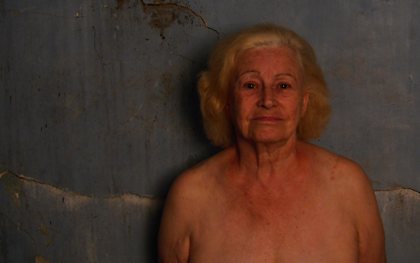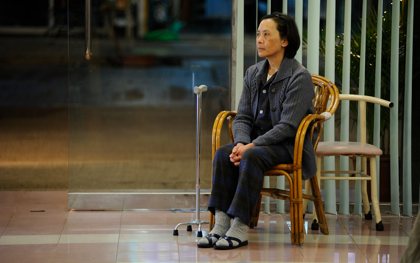Festivals
Venice Film Festival 2011: The S&S blog
Day six: The old and the new

Stories That Exist Only When Remembered
Neil Young, 6 September
Film of the day
At this midway point, the secret to finding worthwhile films at the 2011 Venice Film Festival apparently boils down to concentrating on fictional features made – and projected – on 35mm, showing outside the Golden Lion Competition, which feature as their main protagonist an ancient Brazilian widow living in a remote and picturesque backwater.
These stringent criteria apply to two of the festival’s few genuine discoveries so far: Stories That Exist Only When Remembered (Historias que so existem quando lembradas), an Argentinian/Brazilian co-production by director/co-writer Julia Murat, and today’s highlight Swirl (Girimunho), by Hélvecio Marins Jr. and Clarissa Campolina. The former is one of the dozen features selected for the parallel Giornati degli autori section known in English as ‘Venice Days’, the latter part of the competitive Orizzonti strand supposedly dedicated to edgier, more experimental works (but which this year incongruously found room for the questionable likes of Hollywood star James Franco’s rough-edged squib, Sal).
Whereas Stories That Exist Only When Remembered is fable-like, with touches of magical realism and painterly chiaroscuro photography illuminating its nocturnal interiors, Swirl is simultaneously a more impressionistic but also specific and more grounded affair: a multi-layered and immersive portrait of an independent octogenarian whose sprightly attitude enables her to retain youthful energy well into what we may divine to be her ninth decade on the planet.

Swirl
Bastu, near-universally referred to simply as ‘Grandmother’, is played by Maria Sebastiana Martins Alvaro – like the rest of the cast, a non-professional found by the filmmakers during their researches in the Minas Gerais region of South America’s largest and most populous nation. Her ‘acting’ is direct and improvisational, engagingly ‘imperfect’ at times, in a film which has one foot in documentary – although the event which initiates the picture, the death of Bastu’s sedentary husband Feliciano, is clearly a fictional touch.
Typically, on the night of Feliciano’s demise his wife had been out participating in a raucous neighbourhood music party (an extended, rousingly cacophonous sequence) while he had been slumped in front of the television set. Swirl thus implicitly and vigorously endorses Bastu’s philosophy that “time doesn’t stop – it is us who stop.” Motion and flux are paramount here in a film which may often pause for reflection – as Bastu says when showing her granddaughter secrets of the kitchen, “doing things slowly makes them better; patience is important” – but is otherwise restless in its freewheeling investigation of light, song and ritual in this out-of-the-way corner of Minas Gerais.
The results are unapologetically poetic and philosophical, but with a flowingly immersive rhythm of recurring images and sounds, propelling us from sequence to sequence with Bastu as the constant central figure around whom the impressionistic Swirl hypnotically revolves, right up to the pitch-perfect, poignant final shot.
Swirl gained much from being projected via warm, analogue 35mm prints – something that unfortunately can’t be said for quite a few Venice 2011 selections, including some high-profile contenders for the Golden Lion.
Foggy digits
Case in point: Thomas Alfredson’s Tinker Tailor Soldier Spy, a calculatedly middle-of-the-road adaptation of the John le Carré novel featuring an impeccably minimalist performance from Gary Oldman that instantly propels him into contention for the Volpi Cup for Best Actor here, alongside another British (Isles) challenger, Shame’s Michael Fassbender.

Tinker Tailor Soldier Spy
Alfredson’s film conjures the MI5 atmosphere of sour cynicism with pungent effect, the production-design going overboard to emphasise the dunnish drabness of early-70s London while Hoyte Van Hoytema’s cinematography fills every room – whether smokers are present are not – with a mistiness that occasional thickens into a stygian, stultifying fog.
The resulting palette of oranges, browns and deep shadows was ill-served by being projected digitally here rather than via the richer, more complex hues and darknesses of 35mm – a baffling decision for what is officially termed a “display of international cinematographic art” (“Mostra internazionale d’arte cinematografica”). If Alfredson elected to make the picture using old-fashioned celluloid then surely his artistic choice should be properly conveyed to the audience.
Digital chill
There was no such problem with the day’s other Competition presentation, Ann Hui’s A Simple Life from Hong Kong, as this heartfelt if overlong and underdeveloped story of an elderly maid’s decline into terminal illness was shot (by Jia Zhangke’s DP of choice, Yu Lik-Wai) on digital cameras with slightly chilly results that help prevent proceedings descending into fuzzy sentimentality.

A Simple Life
Then again, it will undoubtedly be very difficult to see Tinker Tailor Soldier Spy on its upcoming UK release in anything other than a Digital Cinema Package, so rapid has been the rush to digital in both arthouses and multiplexes – whether or not the films being shown were actually made on that format. Such are the realities of commercial distribution in the 21st century – but it’s disappointing, to say the least, that film festivals as long-running and prestigious as Venice are so happy to follow suit.
That said, the three current front-runners for the Golden Lion here based on critical esteem and general ‘buzz’ – Steve McQueen’s Shame, Yorgos Lanthimos’s Alps and Sion Sono’s Himizu (unveiled to the press this evening) – were all made and shown on 35mm, a detail that hopefully may delay the festival’s rumoured aim of switching entirely to digital in the very near future.
In the case of films like Swirl and Stories That Exist Only When Remembered, the grain and imperfection of celluloid is a crucial element in transporting us through both space and time to bygone worlds beyond our geographical and chronological horizons. And so long as directors are able and willing to shoot on 35mm – or even 16mm, come to that – festivals that claim to celebrate the art of cinema really should go out of their way to ensure that their wishes and preferences are suitably respected. Of course, it is much cheaper and less bothersome for festivals and distributors alike to push the ‘benefits’ of digital projection. But places like Venice should surely aim to be genuine palaces of cinematic art – and not mere temples of convenience.
« Day five: Dark nights of the soul
Day seven: Vamps, migrants and apocalypse »
See also
Send in the clowns: Rob White on the original TV series of Tinker, Tailor, Soldier, Spy (October 2000)
Poetry reviewed by Trevor Johnston (August 2011)
